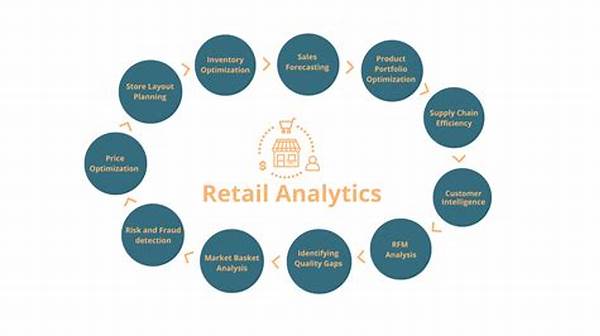In today’s fiercely competitive retail landscape, staying ahead of the curve requires more than just offering quality products and services. It’s about understanding your customers’ needs, preferences, and behaviors to engage them effectively. Retail analytics tools for engagement empower businesses to harness data-driven insights, improve customer interactions, and maximize sales potential. Discover how these robust tools can transform your retail strategy by delivering personalized experiences that resonant with your audience. Let’s delve into the world of retail analytics and uncover the keys to elevating customer engagement.
Read Now : “recommended Local Vintage Shops”
Understanding the Power of Retail Analytics Tools
Retail analytics tools for engagement provide a powerful means to decode customer data, offering actionable insights that guide businesses toward more strategic decisions. By analyzing purchasing patterns, foot traffic, and customer feedback, these tools enable retailers to align their offerings with consumer expectations. In a market saturated with choices, the ability to deliver tailored experiences is indispensable. These analytics tools help retailers build deeper customer connections, enhancing loyalty and satisfaction.
Moreover, the real-time nature of these tools ensures that businesses can swiftly adapt to changing consumer trends. By identifying peak shopping times, popular products, and customer demographics, retailers can fine-tune their strategies to meet demands efficiently. Ultimately, retail analytics tools for engagement are not just about data collection—they are about turning insights into tangible actions that drive growth and build a loyal customer base. Ignoring the potential of such tools is risking your competitive edge in an ever-evolving market.
Elevating Customer Interactions
1. Retail analytics tools for engagement identify shoppers’ preferences, allowing for personalization that enhances customer experience.
2. These tools track real-time consumer behavior, helping retailers optimize in-store layouts to boost engagement.
3. Understanding purchasing patterns through analytics helps retailers stock products that resonate with their audience.
4. Retail analytics tools for engagement also aid in crafting targeted marketing campaigns that resonate with customers.
5. By predicting future trends, these tools enable retailers to proactively adjust strategies, ensuring sustained engagement.
Transforming Retail Strategies through Analytics
Retail analytics tools for engagement play a pivotal role in transforming how retailers engage with their customers. By leveraging these innovative solutions, businesses can move beyond traditional market approaches and embrace a personalized strategy that captivates consumers. Imagine a scenario where you can anticipate customer needs even before they step into your store. That’s the power of retail analytics. These tools provide real-time data that reveal intricate consumer insights, enabling businesses to create highly tailored marketing campaigns that resonate with individual shoppers.
Not only do these tools allow for meticulous audience segmentation, but they also facilitate seamless omnichannel experiences. Customers expect consistency across platforms—be it in-store, online, or mobile. Retail analytics tools ensure that your engagement strategies are cohesive and directed towards nurturing long-term relationships. Through these transformative steps, businesses can cultivate customer loyalty, enhance satisfaction, and drive sales growth in an increasingly competitive market. In essence, retail analytics tools for engagement are the fulcrum upon which modern retail strategies are balanced, making them indispensable for any forward-thinking business.
Strategies for Implementing Retail Analytics Tools
1. Define clear objectives for what you want to achieve with retail analytics tools for engagement.
2. Invest in advanced technology that can integrate seamlessly with existing systems.
3. Train staff on data interpretation to ensure insights are used effectively.
4. Regularly review and adjust strategies based on analytical insights.
5. Foster a data-driven culture that encourages continuous learning and adaptation.
Read Now : Finding Valuable Items In Thrift Stores
6. Focus on real-time data to make swift and informed decisions.
7. Use analytics to anticipate market trends and stay ahead of competitors.
8. Leverage personalized marketing based on customer analytics for higher engagement.
9. Monitor competitor strategies through analytical benchmarks.
10. Ensure customer data privacy by adhering to industry standards and regulations.
Driving Retail Success with Data Insights
The crescendo of success in retail lies in effectively engaging customers through informed decision-making. Retail analytics tools for engagement are the catalyst for such transformation. They empower businesses with the foresight to predict future trends and the insight to understand existing consumer behaviors. Today’s customers are inundated with choices; they resonate with brands that consistently understand and anticipate their needs. With these tools, you can tap into the rich vein of data that not only helps in strategizing current market moves but also in crafting visionary engagements that keep your brand relevant and top-of-mind.
Moreover, it’s not just about selling a product anymore. It’s about cultivating a relationship where customers feel valued and understood. Retail analytics tools for engagement pave the way for such relationships by offering personalized experiences tailored to each buyer’s journey. Whether it’s through exclusive offers, personalized marketing, or a seamless omnichannel presence, maximizing data insights guarantees customer satisfaction and loyalty. In a world where consumer expectations are constantly evolving, keep your brand at the forefront by harnessing the unrivaled power of retail analytics tools.
Crafting a Customer-Centric Approach
Harnessing the full potential of retail analytics tools for engagement requires a commitment to creating a customer-centric approach. The modern consumer seeks not just products but personalized experiences. By integrating retail analytics into your operational model, you can offer each customer a journey that’s tailored specifically to their needs and preferences. Understand their pain points, anticipate their requirements, and provide solutions even before they seek them out. This proactive engagement transforms casual shoppers into loyal brand ambassadors.
Furthermore, a customer-centric strategy prioritizes customer feedback, incorporating it into strategic planning for continuous improvement. Retail analytics tools for engagement enable an iterative approach, allowing businesses to adapt quickly and efficiently to ever-changing consumer landscapes. This adaptability positions your brand as not just a participant in the market but a leader that shapes consumer experiences. Embrace these tools to foster an environment where every decision is informed by comprehensive consumer insights, ensuring your business thrives in today’s complex retail ecosystem.
Conclusion: Embracing the Future of Retail
Retail analytics tools for engagement represent the future of retail, transforming data into actionable insights that redefine how businesses interact with their clientele. These tools are not just optional enhancements; they are necessary for survival and growth in a digitized market landscape. By adopting these solutions, retailers can ensure they offer bespoke experiences that attract and retain customers in an ever-evolving market. As consumer expectations rise, leveraging data to create personalized engagements isn’t just advantageous—it’s essential for staying relevant.
The journey into harnessing retail analytics tools may require an investment of time and resources, but the return is a robust competitive edge and heightened customer loyalty. In conclusion, embracing these analytic tools is about more than optimizing operations; it’s about pioneering a new standard of customer interaction that stands the test of time. By prioritizing analytics-driven engagement strategies, you equip your business to thrive not just today, but in the future retail landscapes as well.




